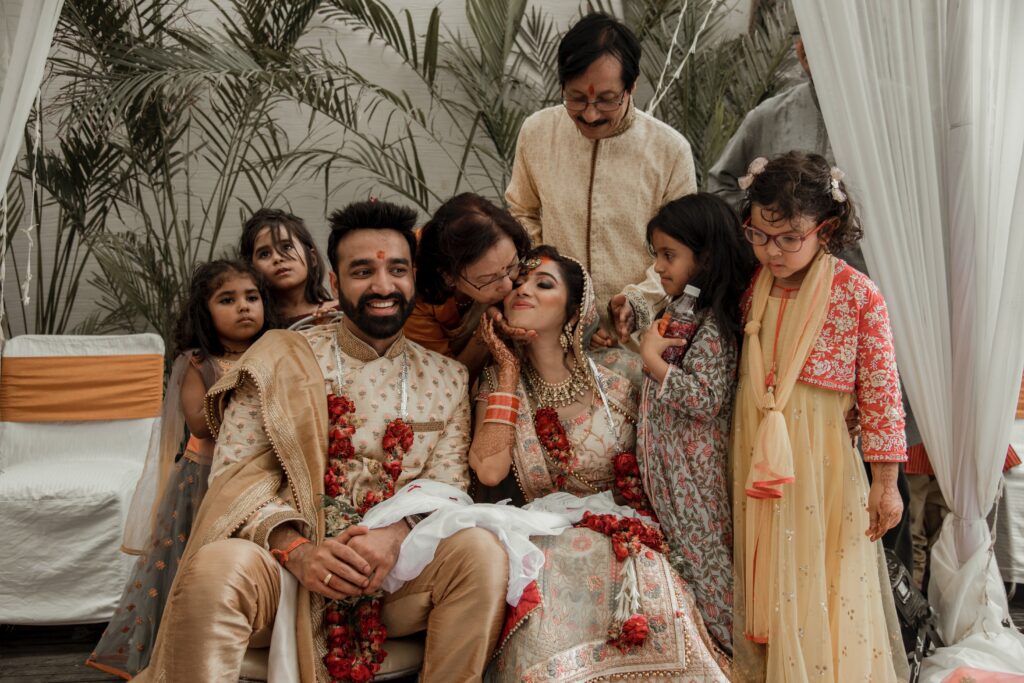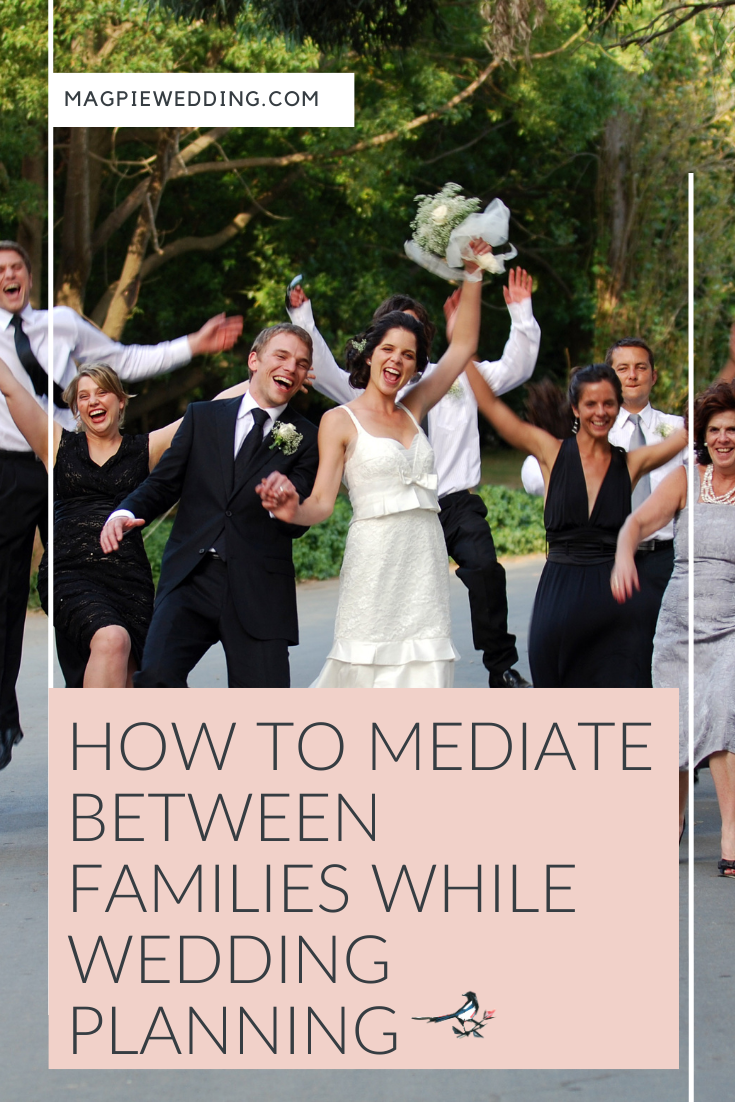Wedding planning is an exciting and memorable experience for any engaged couple, but it can also be a stressful and overwhelming process. Family dynamics can often add to this stress, but with the right approach, you can mediate between families and create a wedding that everyone can enjoy. Here are some tips to help you navigate this process successfully:

Listen to both sides
It’s essential to hear and value each family’s ideas and concerns. Taking the time to listen can help everyone feel heard and involved in the planning process. It can also lead to a more cooperative atmosphere where everyone is willing to compromise.
While it may be tempting to take sides or promise things you can’t deliver, it’s best to remain neutral. Focus on finding common ground and areas of compromise instead of making promises that could lead to misunderstandings.
Establishing clear boundaries can help prevent misunderstandings and ensure that everyone is working towards the same goal. Be clear on who is responsible for each task, and make sure everyone understands their role in the planning process.
Keep communication open
When planning a wedding, there are a lot of details to keep track of, and it’s essential to ensure that everyone involved is informed and up-to-date. Regular communication with both families can help prevent misunderstandings and ensure that everyone feels heard and valued.
It’s important to establish clear lines of communication early on in the planning process. Make sure that everyone knows how to get in touch with each other and who to contact if they have questions or concerns. Consider setting up regular check-ins, whether through in-person meetings, phone calls, or video chats, to discuss any updates or changes to the wedding plans.
Compromise
Compromise is key when working with different family members. Be willing to give a little on some details, and encourage both families to do the same. This can help create a wedding that reflects both families’ values and traditions. Be open to changing plans or making adjustments to accommodate both families’ needs and expectations. Flexibility is key when mediating between families.

Establish priorities
Establishing priorities is an essential step in the wedding planning process, especially when dealing with multiple families. Prioritising helps you to understand what is most important to each family, allowing you to focus your attention and resources on the most critical aspects of the wedding.
It is essential to have a clear understanding of what each family values most when it comes to the wedding. This can include anything from the type of ceremony, to the venue, to the menu. Once you have a clear understanding of everyone’s priorities, you can begin to make decisions that satisfy everyone’s needs.
For example, if one family places great importance on the wedding ceremony, you may choose to prioritise finding a venue that can accommodate their religious or cultural traditions. If another family values the reception more, you may want to focus on finding a venue that can provide an excellent dining experience and entertainment.
Be respectful
Even if you don’t agree with a family member’s ideas or opinions, it’s essential to remain respectful and avoid getting defensive. Try to keep the conversation focused on finding solutions rather than winning an argument.
Consider hiring a wedding planner
Hiring a wedding planner can be a game-changer for couples who are planning their wedding, especially when it comes to managing family dynamics. A wedding planner can provide expert advice and guidance on how to navigate potential conflicts or challenges that may arise during the planning process. They are experienced in working with families and can help you establish clear boundaries, set realistic expectations, and make compromises that everyone can agree on.
One of the main benefits of hiring a wedding planner is that they can provide an objective perspective on family dynamics. They can help you identify potential conflicts before they arise and come up with solutions that work for everyone involved. For example, if one family member is insistent on having a certain element in the wedding, but it clashes with another family member’s vision, a wedding planner can help find a compromise that satisfies both parties.

Keep the budget in mind
Weddings can be expensive, and it’s important to set a budget that works for you and your partner. However, it’s also important to consider the financial implications for both families. It’s essential to have open and honest communication with both families about the budget to avoid any misunderstandings or hurt feelings.
One of the best ways to keep everyone on the same page when it comes to the budget is to establish clear expectations from the beginning. Start by setting a budget and then determine which items are the highest priority for both families. For example, some families may value an extravagant venue or a gourmet menu, while others may prioritise the entertainment or photography.
Be inclusive
Being inclusive is an important aspect of mediating between families while wedding planning. When both families feel included in the planning process, they are more likely to feel invested in the wedding and feel like their opinions and traditions are being honoured.
One way to include both families is to invite them to participate in wedding-related activities, such as dress shopping, cake tasting, or venue tours. You can also ask for their input on various aspects of the wedding, such as the menu or music selection.
It’s important to keep in mind that each family may have different expectations or ideas about their involvement in the wedding. Some may prefer to be more hands-on, while others may want to be more involved in a specific aspect of the wedding, such as the ceremony or reception.
Don’t rush decisions
Planning a wedding can be a stressful and time-consuming process, and it can be tempting to rush through decisions in order to move on to the next task on the to-do list. However, taking the time to consider each family’s ideas and concerns before making any decisions is crucial to avoiding misunderstandings and hurt feelings.
When making decisions about the wedding, it’s important to consider how they may impact each family’s expectations and desires. Rushing through decisions can mean overlooking important details or neglecting to consider the input of family members. This can lead to disagreements, misunderstandings, and hurt feelings.
Celebrate differences
When it comes to wedding planning, it’s important to remember that each family is unique, with its own set of traditions and values. Embracing and celebrating these differences can help create a wedding that truly reflects the couple and their families.
One way to incorporate these differences into the planning process is to consider incorporating cultural or religious traditions into the ceremony or reception. For example, if one family has a tradition of exchanging gifts or performing a special dance, this could be included as part of the wedding festivities. Similarly, the menu or decor could reflect the cultural backgrounds or tastes of both families.
Another way to celebrate differences is to involve family members in the planning process. For example, if a family member has a particular talent or skill, such as flower arranging or calligraphy, they could be asked to contribute to the wedding in that way. This can help create a sense of unity and shared purpose among both families.

Seek outside help if necessary
Planning a wedding can be an emotional and stressful experience, especially when dealing with conflicting family dynamics. Despite your best efforts to keep the peace, you may find that some issues are too complicated to resolve on your own. When this happens, it may be time to consider seeking outside help.
One option is to consult with a therapist or counselor who specializes in family dynamics. These professionals are trained to help individuals and families navigate difficult situations and can provide support and guidance to help resolve conflicts. A therapist can help you identify the underlying issues causing tension between family members, and work with you to develop effective communication and conflict resolution strategies.
Another option is to work with a professional mediator. A mediator is a neutral third party who can help facilitate communication and negotiation between family members. They can assist in identifying common ground and finding solutions that work for everyone involved. Mediation can be particularly helpful when dealing with complex legal or financial issues.
Remember what’s important
At the end of the day, the most important thing is that you’re getting married to the person you love. Keep this in mind when dealing with family dynamics, and try not to let conflicts overshadow the joy of the occasion.
By following these tips, you can mediate between families and create a wedding that everyone can enjoy. Keep in mind that a wedding is a celebration of love and family, and by working together, you can create a special day that everyone will remember for years to come.
IF YOU FOUND THIS USEFUL THEN WHY NOT PIN IT?







You must be logged in to post a comment.